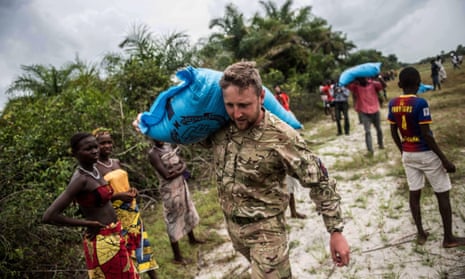The UK is spending too much on humanitarian aid and funding big international agencies when it should be concentrating on its own long-term development programmes in sub-Saharan Africa, an influential group of MPs has warned.
In its latest annual report on the Department for International Development (DfID), the International Development Committee (IDC) says the government’s focus on responding to disasters and emergencies is allowing other wealthy countries to shirk their responsibilities.
The committee also notes that the push to spend 0.7% of the UK’s gross national income on overseas aid has given DfID a series of financial headaches.
Last year, to help it meet the four-decade-old UN target of spending 0.7% of gross national income on official development assistance (ODA), DfID’s budget rose by about a third to £11.46bn.
Although the committee expressed pride in achieving the 0.7% goal – which will now be enshrined in law – it said it had caused problems and skewed when, how and where DfID spends its budget, with more money now going to multilateral organisations such as the EU, the World Bank and the Global Fund to Fight Aids, Tuberculosis and Malaria.
The UK is now the world’s largest funder of multilaterals, spending £6.3bn on multilateral organisations in 2013, and providing 50% more multilateral ODA than any other country.
“We are concerned that the scale of the increase in spending in the time of restrictions on administrative costs has led DfID to overuse multilaterals and large suppliers at the expense of smaller specialists,” said the committee’s chair, Sir Malcolm Bruce.
The IDC said that funding multilaterals was attractive to DfID as it allowed the department to use promissory notes, which count as ODA expenditure but do not have to be paid for until the cash is drawn down – often years later.
The rise in multilateral funding, the IDC noted, had been accompanied by a relative decline in spending on programmes in sub-Saharan Africa and on some key millennium development goal targets. It urged DfID to spend more on bilateral programmes, on sub-Saharan Africa, and to “significantly increase spending on reproductive health”.
The committee expressed dissatisfaction over the fact that DfID now provides 13% of all the money spent on humanitarian assistance by the 34 members of the Organisation for Economic Cooperation and Development (OECD): “This is too much and enables other OECD donors to fail to meet their obligations.”
One NGO, Water Aid, told the committee that DfID spent more on addressing health crises than preventing them through basic sanitation, while two other NGO networks said the increase in humanitarian spending had coincided with a reduction in non-emergency spending on governance and security.
DfID, however, prides itself on its reputation for providing humanitarian aid, on which it spent £891m in 2013-14. The department’s permanent secretary, Mark Lowcock, told the committee: “It is absolutely the case that the secretary of state feels quite strongly that this is something that the department is good at, the needs are very acute and it resonates with the public, so it is an important thing for the UK to contribute to.”
Others witnesses disagreed, saying the large increase in humanitarian expenditure “that gets government ‘a rosy glow’ reacting to the news spotlight might be coming at the expense of longer-term development work needed”.
In response, the committee suggests DfID introduce a ceiling on its humanitarian assistance expenditure to ensure that long-term development does not suffer as a result.
Mary Creagh, the shadow secretary of state for international development, said the report showed that the coalition government was failing to help many of those most in need.
“70% of the world’s poor are women, yet DfID under the Tories and Lib Dems has spent less on women’s reproductive health despite overall budget increases,” she said.
“Labour will ensure more UK taxpayers aid money goes to the poorest people in the world’s poorest countries and ensure the needs of women, children and other excluded groups are not forgotten.”
DfID defended its funding decisions, arguing that the proportion of UK development aid spent as multilateral aid had stayed roughly the same, while the proportion of bilateral aid spent in Africa had not changed over the past two years.
“We fund multilaterals when they are the best partners to work with us to deliver our objectives, whether that be in a humanitarian crisis, natural disaster or on a specific topic such as migration and refugees,” said a spokeswoman.
“We are living in a world that is facing unprecedented humanitarian pressures. The UK is proud to be a world leader in responding to emergencies.”

Comments (…)
Sign in or create your Guardian account to join the discussion